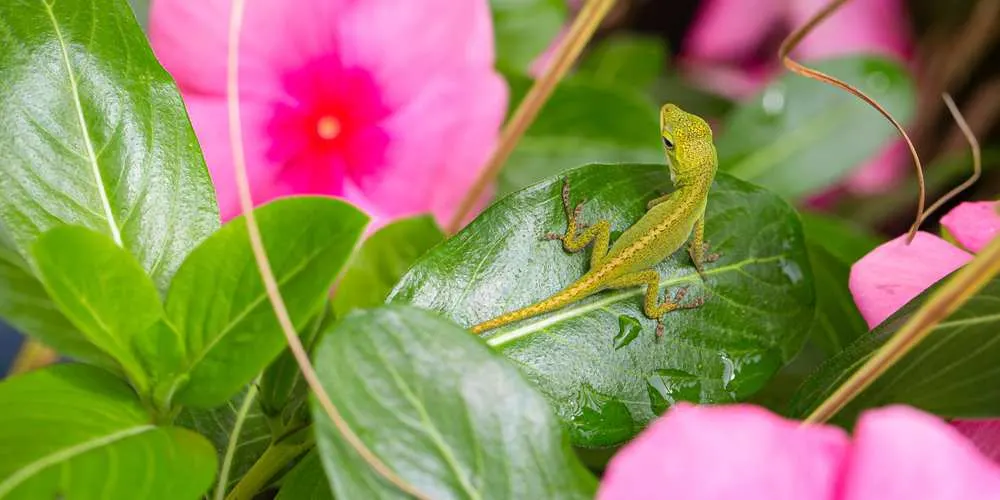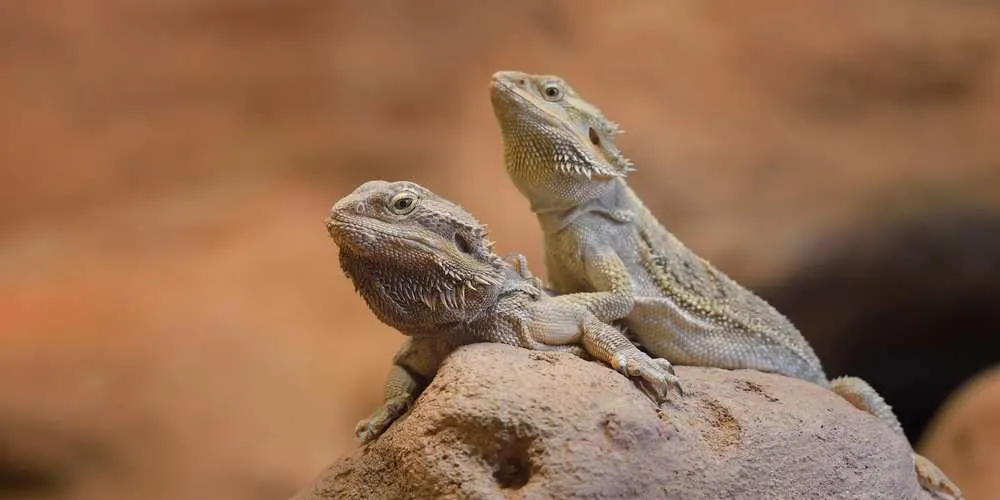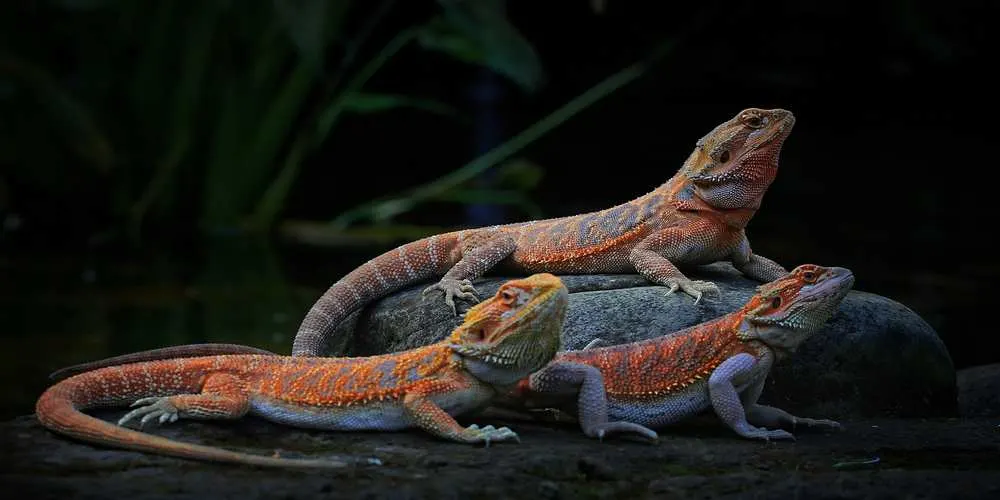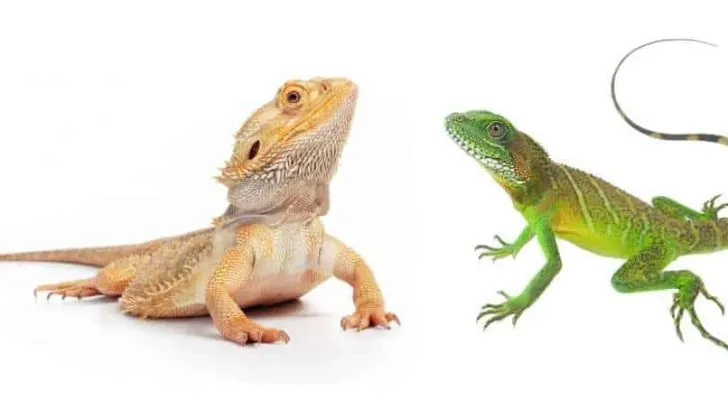Feeding one animal to another can seem cruel to people who don’t have pets similar to beardies. But, to the ones who have fed their pets other smaller animals before, especially your bearded dragons, you must have asked yourself:
Can bearded dragons eat anoles?
Besides the potential cruelty in it, beardies shouldn’t eat anoles. If I were you, I wouldn’t be bummed about it because there is a wide variety of other things bearded dragons enjoy eating.
In case you’re not familiar with insects that you can feed your pet instead of anoles, or if you’re a beginner in beardie parenting, you’ll find this article quite helpful.
To learn all about feeding time when it comes to your pet, and maybe some new tips and tricks regarding this topic, I suggest you grab a cup of your favorite drink and get comfy. Let’s dive in!

Feeding Bearded Dragons Anoles – Not A Good Idea
Keeping in mind that there are a lot of animals that eat other animals in the wild but are kept as pets (like most big snakes), it shouldn’t be a problem for your beardie to devour an anole. But, this is an exception to this rule.
Anoles aren’t poisonous or venomous, but they aren’t as full of nutrients as some other foods that your beardie might enjoy. This is one of the two biggest problems with the idea of implementing anoles as a regular part of your beardies diet, or even as an occasional meal.
The other problem with anoles is that they often carry diseases and parasites. The biggest risk is salmonella. This disease is frequently carried by anoles and it is not pleasant to deal with.
This is a huge reason to avoid feeding your beardies with anoles. If your pet contracts the salmonella, you’ll have to spend a lot of time and money just to cure it, and imagine how easy it was to avoid it.
The tummy of your bearded dragon can digest the anole if it accidentally eats one, but its system can’t get almost any nutrients out of it. There are only bad ways this can end.
For one, nothing has to happen. Your pet can eat an anole and nothing will happen. This is the best outcome for both you and your beardie. Knowing this is the least possible way to end this situation, I wouldn’t count on this to happen.
The second scenario is that your bearded dragon experiences some tummy pain and has potential diarrhea. This is something to keep an eye out for because it can be unpleasant. If this happens, feed your pet with fiber-rich food and try to contain the mess.
The third and last scenario is the nastiest one. Sadly, your beardie can experience some severe health issues after eating an anole. This is due to the sensitivity of your beardies stomach. If this happens, you’ll notice a drastic difference in your pet’s behavior for the worse (this can include severe lack of energy and passive behavior).
You’re probably a little bit confused because both of the bad scenarios are pretty similar to each other. This is a pretty bad thing because they can be easily mistaken for one another.
To avoid this, and keep yourself stress-free you should consult someone who is more experienced on the topic.
My Beardie Ate An Anole – Help!
The first step in every stressful situation is to keep a cool head. This ensures you follow some easy steps that will ensure your pet’s well-being. In this particular situation, there’s little you can do, but there’s a guide you need to follow. Here it is:
- Call your beardies vet – remember, vets are trained professionals and know what to do better than you
- Explain what happened – in crucial detail, explain to your vet what happened – this helps him know what instructions to give you
- Give your beardie enough water – water always helps – it dissolves the contents of your pet’s stomach so it’ll prolong some negative side effects
- Take it to the vet – This is a crucial step; if your vet tells you to bring your pet on an examination, do it immediately (this can save its life!)
Unfortunately, there’s nothing you (as an untrained person) can do, so you must contact someone who knows everything there is on the subject.
When you get to your beardies vet, you’ll probably be given some instructions on how to monitor your pet’s behavior and how to act in certain situations. It’s best if you write them down so you don’t forget them. Make a to-do list near your pet’s cage so every time you head there you have a little reminder of this.
If your pet doesn’t show any negative side effects during the time of the examination, that doesn’t mean your beardie will be fine. For this reason, you need to monitor it for a period of time that is long enough for your pet to digest and dispose of the unwanted food in its stomach.
Depending on the severity of the situation, your vet might recommend some laxatives to speed up that process, but NEVER give your pet any medication without consulting a trained professional before you do it.
If your pet says that you just need to keep an eye out for your pet’s behavior, check it every few minutes to see how it’s doing. By doing this you are making sure that even if some negative side effects occur, you’ll be able to act quickly not long after the side effects begin.

Alternatives To Anoles In Bearded Dragon’s Diet
I’ve mentioned earlier that there are some fantastic alternatives that are rich in protein and fiber, which are the ingredients your beardie truly craves every day!
Insects are a huge part of almost every lizard’s diet. This is due to their natural instincts for hunting which were developed many years ago. Instead of trying to feed your beardie with mice or other lizards such as anoles, you should stick to some of these:
| King Worms: | These are perfect as a portion of regular food for your pet. Almost any worm is a good and safe option but stick to those named here. |
| Butter Worms: | Another perfectly safe worm for regular consumption when talking about the beardie diet. They can be a bit cheaper when compared to king worms. |
| Earth Worms: | These are the most commonly used worms when feeding your pet. They can be found in virtually any pet store and are perfectly safe for your beardies to enjoy. |
| Super Worms: | These are also a fantastic choice, but keep in mind that they are much bigger than the rest of the worms listed here, so they are suitable to be fed only to fully grown adults and should never be fed to smaller bearded dragons. |
| Dubia Roaches: | This is a controversial one. Some people (me included) are grossed out by the roaches in general. If you’re one of these people I recommend avoiding this option. Another downside to these is that they tend to bury themselves whenever they get the chance to avoid being eaten. Nevertheless, they’re perfectly safe for bearded dragons. (all of this also goes for cockroaches) |
| Crickets: | These are probably the best option if you want to give your beardie something besides worms. There are some downsides, but they aren’t huge. Some people might find the smell of cricket discomforting, and some might not even notice it. Another thing is that live cricket makes noise, so that’s another thing to consider. |
You can always throw in some veggies, fruits, or greens in your bearded dragon’s diet for a little bit of a surprise snack. Some that I like to use are broccoli, clover, apples, or acorn squash.

Final Thoughts
If you’re still wondering can bearded dragons eat anoles, you shouldn’t. It’s not only unsafe to do, but it’s cruel in a way. Remember that anoles are also kept as house pets and that people see them as that.
Besides that, there are such good alternatives to anoles that I wouldn’t bother by trying this. Beardies enjoy every single option I’ve listed that it wouldn’t even cross their mind to eat another lizard.
So, if you want to buy an anole, I suggest you keep it as a pet in a different cage from your bearded dragon and love it as much as you love all your pets!


